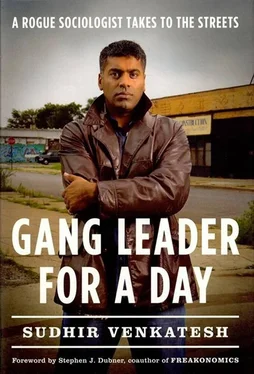As a kid she had wanted to study math. But her father, she told me, said that higher education was inappropriate for a young black woman. He advised her instead just to get married and have children.
Catrina had a love of knowledge and would participate in a discussion about nearly anything. I enjoyed talking with her about science, African-American history, and Chicago politics. She always wore a studious look, intense and focused. Working as Ms. Bailey’s assistant, she received just a few dollars a week. But, far more significant, she was receiving an apprenticeship in Chicago politics. “I will do something important one day,” she liked to tell me, in her most serious voice. “Like Ms. Bailey, I will make a difference for black people. Especially black women.”
By this time Catrina had been living in Robert Taylor for a few years. But over the July Fourth holiday, she decided to visit her siblings in Chicago’s south suburbs, an area increasingly populated with African-American families who’d made it out of the ghetto. From what I was told, her father heard that she was visiting and tracked her down. A skirmish followed. Catrina got caught between her brother, who was protecting her, and her angry father. A gun went off, and the bullet hit Catrina, killing her instantly. No one around Robert Taylor knew if either the brother or the father had been arrested.
The funeral was held in the back room of a large African Methodist Episcopal church on the grounds of Robert Taylor. The hot air was stifling, the sun streaming in shafts through dusty windows. There were perhaps fifty people in attendance, mostly women from Ms. Bailey’s building. A few members of Catrina’s family were also there, but they came surreptitiously because they didn’t want her father to hear about the funeral. Ms. Bailey stationed herself at the room’s entrance, welcoming the mourners. She looked as if she were presiding over a tenant meeting: upright, authoritarian, refusing to cry while consoling those who were. She had the air of someone who did this regularly, who mourned for someone every week.
Sitting in a corner up front was T-Bone, his head down, still as stone. He and Catrina had been seeing each other for a few months. Although T-Bone had a steady girlfriend-it wasn’t uncommon for gang members, or practically any other young man in the projects, to have multiple girlfriends-he and Catrina had struck up a friendship and, over time, become lovers. I sometimes came upon the two of them studying together at a local diner. T-Bone was about to leave his girlfriend for Catrina when she was killed.
Any loss of life is mourned in the projects, but there are degrees. Young men and women who choose a life of drugs and street gangs may, understandably, not be long for this world. When one of them dies, he or she is certainly mourned, but without any great sense of shock; there is a general feeling that death was always a good possibility. But for someone like Catrina, who had refused to follow such a path, death came with a deep sense of shock and disbelief. She was one of thousands of young people who had escaped the attention of social workers, the police, and just about everyone else. Adults in the projects pile up their hopes on people like Catrina, young men and women who take a sincere interest in education, work, and self-betterment. And I guess I did, too. Her death left me with a sting that would never fade.
The essays that Catrina used to write covered the difficulties of family life in the projects, the need for women to be independent, the stereotypes about poor people. Writing seemed to provide Catrina a sense of relief, as though she were finally acknowledging the hurdles of her own past; it also helped her develop a strong, assertive voice, not unlike that of her hero, Ms. Bailey.
In tribute to Catrina, I thought I’d try to broaden this idea by starting a writing workshop for young women in the building who were interested in going back to school. I brought up the possibility with Ms. Bailey. “Good idea,” she said, “but take it slow, especially when you’re dealing with these young women.”
I was nervous about teaching the workshop, but I was also eager. My relationship with tenants up to this point had largely been a one-way street; after all this time in Robert Taylor, I felt as though I should give something back. On a few occasions, I had managed to solicit donations from my professors, fifty or a hundred dollars, for some kind of program in the neighborhood. This money might do a great deal of good, but it seemed to me a fairly impersonal way of helping. I was hoping to do something more direct.
In the past I hadn’t been drawn to standard charitable activities like coaching basketball or volunteering at a school, because I wanted to differentiate myself from the people who helped families and ran programs in the community. I had heard many tenants criticize the patronizing attitudes of such volunteers. The writing workshop, however, seemed like a good fit. Having hung out in the community for several years, I believed I could avoid the kind of fate- exclusion, cold stares, condescending responses-that often greeted the people who rode into town to do good.
I was also still reeling from the fact that I had alienated so many people around J.T.’s territory. I was feeling guilty, and I needed to get people back on my side again.
Of all the people in the projects, I had the least experience spending time with young women, particularly single mothers. I was a bit nervous, particularly because Ms. Bailey, Ms. Mae, and other older women warned me not to get too close to the young women. They felt that the women would begin looking to me as a source of support.
In the beginning the group convened wherever we could-in someone’s apartment, at a diner, outside under a tree. At first there were five women in the group, and then we grew to roughly a dozen as more people heard about it. The meetings were pretty casual, and attendance could be spotty, since the women had family and work obligations.
From the outset it was an emotional experience. The women wrote and spoke openly about their struggles. Each of them had at least a couple of children, which generally meant at least one “baby daddy” who wasn’t in the picture. Each of them had a man in her life who’d been either jailed or killed. They spoke of in-laws who demanded that the women give up their children to the father’s family, some of whom were willing to use physical force to claim the children.
Their material hardships were overwhelming. Most of them earned no more than ten thousand dollars a year, a combination of welfare payments and food stamps. Some worked part-time, and others took in boarders who paid cash or, nearly as valuable, provided day care so the young women could work, run errands, or just have a little time for themselves.
The most forceful stories were the tales of abuse. Every single woman had been beaten up by a boyfriend (who was usually drunk at the time), some almost fatally. Every one of them had lived in fear for days or weeks, waiting for the same man to return.
One cold autumn evening, we congregated at a local diner. We found a large table in the back, where it was quiet. The owner was by now accustomed to our presence, and he didn’t mind that we stayed for hours. If business was particularly good, he’d feed us all night long and then waive the tab. He and I had struck up a friendship-I often came to the diner to write up my field notes- and he liked the fact that I was trying to help tenants.
The theme of this week’s essay was “How I Survive.” Tanya was the first to read from her journal. She was twenty years old, a high-school dropout with two children. She’d stayed with her mother after the first child was born but eventually got her own apartment in the same building, then had a second baby. She didn’t know the whereabouts of the first father; the second had died in a gang shooting. In her essay she bragged about how she earned twice her welfare income by taking in boarders.
Читать дальше












